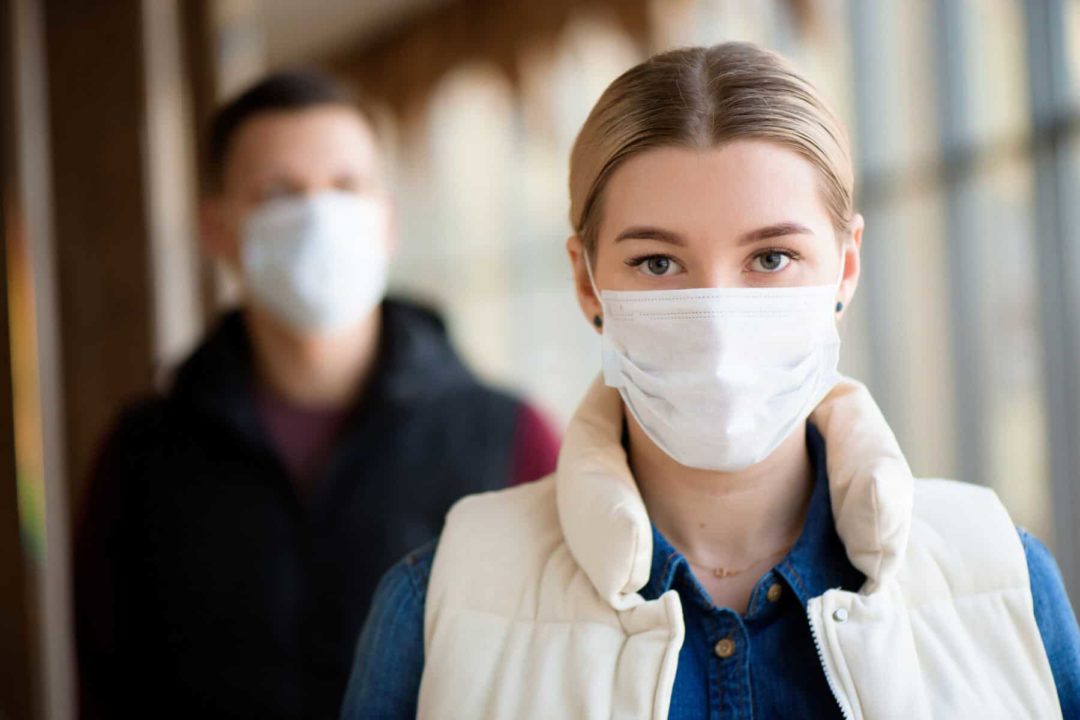The virus is gone, but the symptoms won’t quit. A significant percentage of COVID-19 patients continue to have troublesome symptoms lasting months after the primary disease itself. One of the reasons is believed to be endothelial dysfunction (a malfunction of the endothelium in artery linings). Other factors include coagulopathy, microcirculatory, and inflammation problems. The symptoms are varied, but mostly centered on cardiovascular and respiratory problems.
As the Harvard Health Letter reports, surveys indicate that 50% to 80% of patients continue to have bothersome symptoms three months after the onset of COVID-19 (1). The severity of the COVID-19 may not be a factor in whether a patient becomes a long-hauler or not. The Harvard Health Letter warns, “studies indicate that one in 10 people with COVID-19 may develop long COVID that lasts at least a year. Ultimately, how long these illnesses last, remains to be determined” (1). According to the Harvard Health Letter, the most common symptoms are fatigue, body aches, shortness of breath, difficulty concentrating, inability to exercise, headache, and difficulty sleeping.
The most important conditions that occur in patients during COVID-19 include cytokine storm, coagulopathy (prolonged or excessive bleeding), endothelial inflammation, microcirculatory problems, and capillary leak syndrome. A 2020 review references many studies that demonstrate that Pycnogenol provides support for the body against all these conditions (2).
The virus that causes COVID-19 especially attacks the respiratory system. I think there are about 90 studies showing that Pycnogenol would help. Pycnogenol has anti-inflammatory actions that could help the body deal with cytokine storms, the number one problem. Pycnogenol normalizes platelet aggregation to help the body prevent coagulation. Pycnogenol improves endothelial function to help prevent endothelial inflammation. Pycnogenol also improves microcirculation and reduces capillary leakage.
Now a clinical study has been published that confirms Pycnogenol’s effectiveness as nutritional support against Post-COVID (3).
Since the health of millions worldwide is involved, I have called upon one of the researchers to discuss this important new study.

Carolina Burki, MSc., is Director of Product Development at Horphag Research since 2007. Before joining Horphag, Burki had over 20 years of professional experience in the pharmaceutical industry in clinical research and in scientific competitive intelligence. She graduated from the University of Lausanne with a Master of Science in Molecular Biology.
Passwater:Ms. Burki, the new clinical study by you and your colleagues confirms a path for relief for the millions of long-haul COVID sufferers around the World. What are the important findings?
Burki: We found that patients, supplemented with Pycnogenol after having COVID-19, showed significantly better recovery from signs and symptoms associated with post-COVID compared to control patients. Not only did the physical symptoms improve, but also the quality of life and mood and fatigue-related problems ameliorated significantly.
Passwater:Your colleagues included Professor Gianni Belcaro and 10 others at Irvine Labs, OOLEX Project for Covid, Chieti, Italy and Department of Medical, Oral and Biotechnological Sciences, D’Annunzio University, Pescara, Italy. What type of clinical study was it?
Burki:The study was a 3-month open supplement study with 60 patients, 35 to 70 years old, suffering from post-COVID symptoms at least 2 months after the viral infection. We wanted to find out if there were effects of Pycnogenol supplementation on post-COVID symptoms. 30 patients followed a standard recovery management while 30 comparable patients received 150 mg Pycnogenol daily (in 3 doses of 50 mg) for 3 months in addition to the standard management.
Passwater:Normally, when the virus leaves the body, the symptoms leave as well. Why the problem with long-haul COVID?
Burki:The occurrence of post-COVID symptoms cannot yet be fully explained, but scientists are working hard on this worldwide issue. We know that the virus that triggers COVID-19 (SARS-CoV2) enters the body via the respiratory system but can then attack other organs by entering the inner lining of blood vessels (the endothelium) all over the body. Thus, COVID-19 is now considered an endothelial disease, affecting the lungs, the brain, the heart, the gastrointestinal tract, kidneys, the liver, the skin, the eyes, and the nose, potentially creating microcirculatory problems and blood clots. Even when the virus has left the body, the endothelium is still inflamed from the viral attack, leading to persistent symptoms.
Passwater:If these persistent symptoms aren’t given nutritional support, can there be permanent damage?
Burki:We don’t know enough about this virus yet, but persistent inflammation has been described to trigger chronic diseases or auto-immune diseases after other virally or bacterially transmitted infections. Medicinal as well as nutritional support for the body would be advisable as early as possible to avoid permanent damage.
Passwater:Pycnogenol is a safe nutrient extracted from the bark of the French Maritime Pine tree that has been studied in many clinical trials. How does it work to improve the health of the arteries?
Burki:Pycnogenol has been shown to improve arterial health by preventing arterial constriction, improving blood flow, leading to adequate tissue perfusion, preventing blood clots, and by exerting anti-inflammatory effects directly in blood vessels.
Indeed, previous research has shown that Pycnogenol metabolites are actively taken up by blood cells and the endothelium that lines all blood vessels. Therefore, Pycnogenol exerts its anti-inflammatory and its antioxidant properties directly in blood vessels where the virus infects the body.
An important clinical study done at the University of Zürich, Switzerland, published in theEuropean Heart Journal, has already established Pycnogenol’s benefits on endothelial function.
Passwater:What were the findings about endothelium dysfunction in the clinical trial? Please explain the measurements.
Burki:In this study, all patients had a low endothelial function at inclusion. After 3 months of Pycnogenol intake, the endothelial function was significantly improved.
Endothelial function was assessed with two methods:
- The flow-mediated vasodilation of the brachial artery is an established noninvasive technique to assess endothelial function. A brachial cuff is placed on the arm of the patient. Following release of the cuff, the artery size increases as a normal reaction. The more it increases the better is the endothelial function. After 3 months, the endothelial function (flow-mediated vasodilation) was significantly improved by 189% in the Pycnogenol group compared to the beginning of the study and only by 22% in the control group.
- Reactive hyperemia is another noninvasive assessment of endothelial function and microcirculation. Finger skin flow is measured with a laser Doppler flowmeter following brachial cuff release. Pycnogenol increased reactive hyperemia by 116% compared to the start of the study.
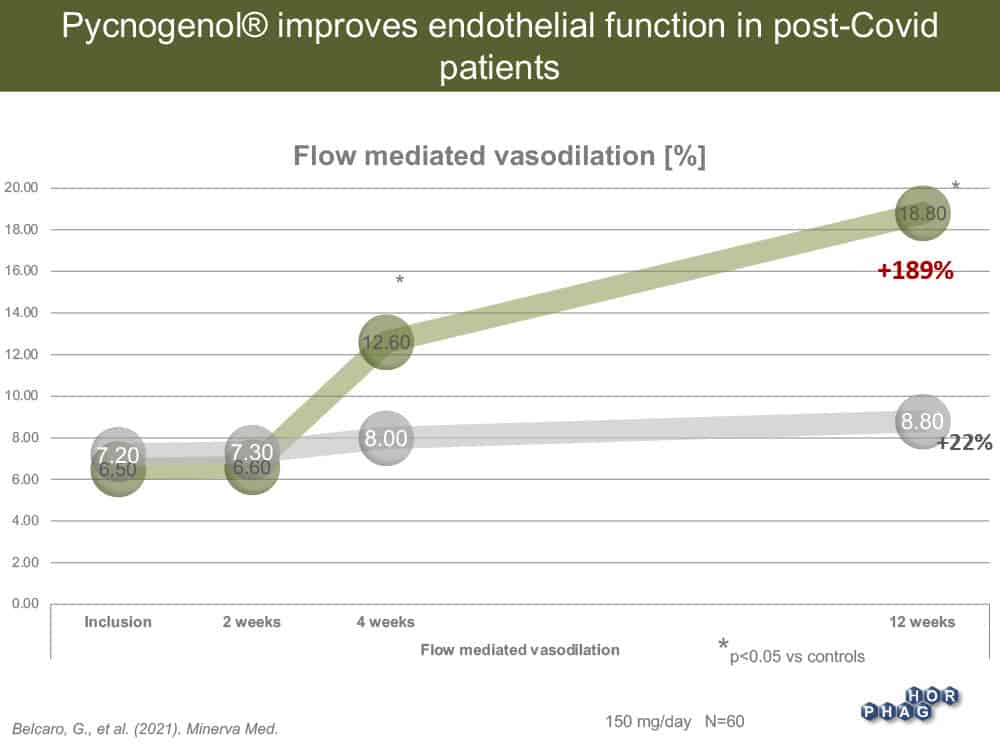
Passwater:Did the study show that Pycnogenol also improved microcirculation?
Burki:A healthy microcirculatory function is very important for an optimal supply of oxygen and nutrients to tissues as well as for a better waste removal. The study results show that Pycnogenol improved microcirculation in post-COVID patients.
Microcirculation was also assessed by measuring the rate of ankle swelling. The ankle circumference increases when the patient stands for 10 minutes after laying for 30 minutes. Pycnogenol reduced the rate of ankle swelling by 45% whereas it was only reduced by 10% in the control group after 3 months.
Microcirculation was also assessed in the kidney by ultrasound. Kidney blood flow was measured as blood flow velocity. The systolic blood flow velocity in the kidney was improved by 15% in the Pycnogenol patients (in controls by 2%).
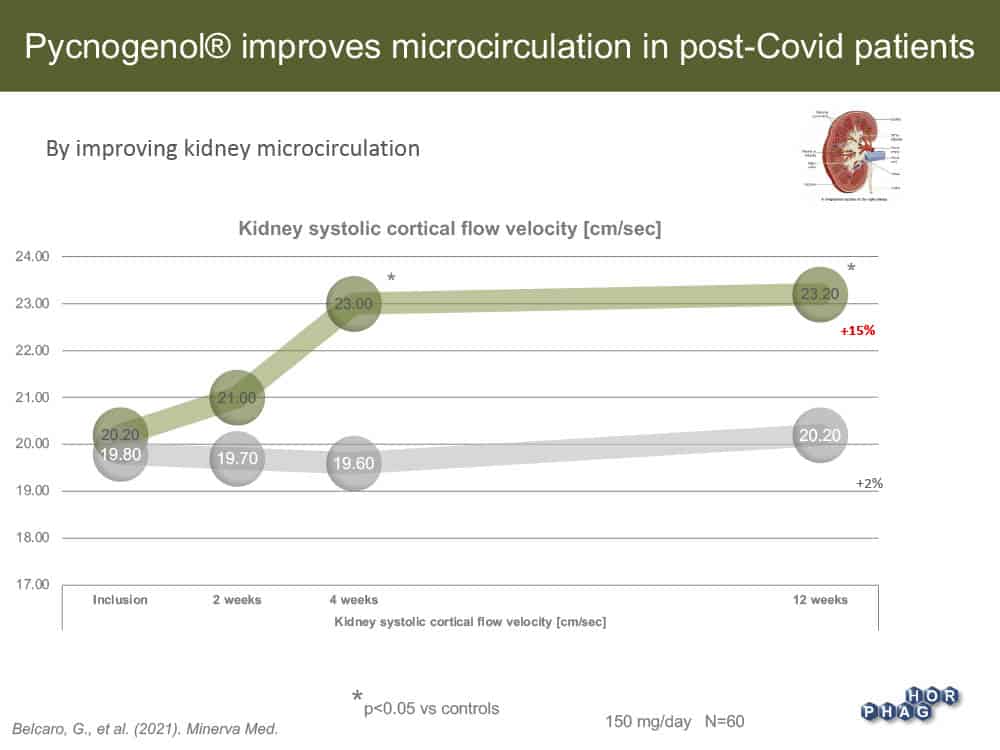
Passwater:Pycnogenol is also known for reduction of inflammation. Did the clinical study see a benefit of Pycnogenol on inflammation?
Burki:Yes, several inflammatory markers (IL-6 and CRP) were measured in the blood of the patients and there was a significant decrease of inflammation after Pycnogenol supplementation compared to the control patients.
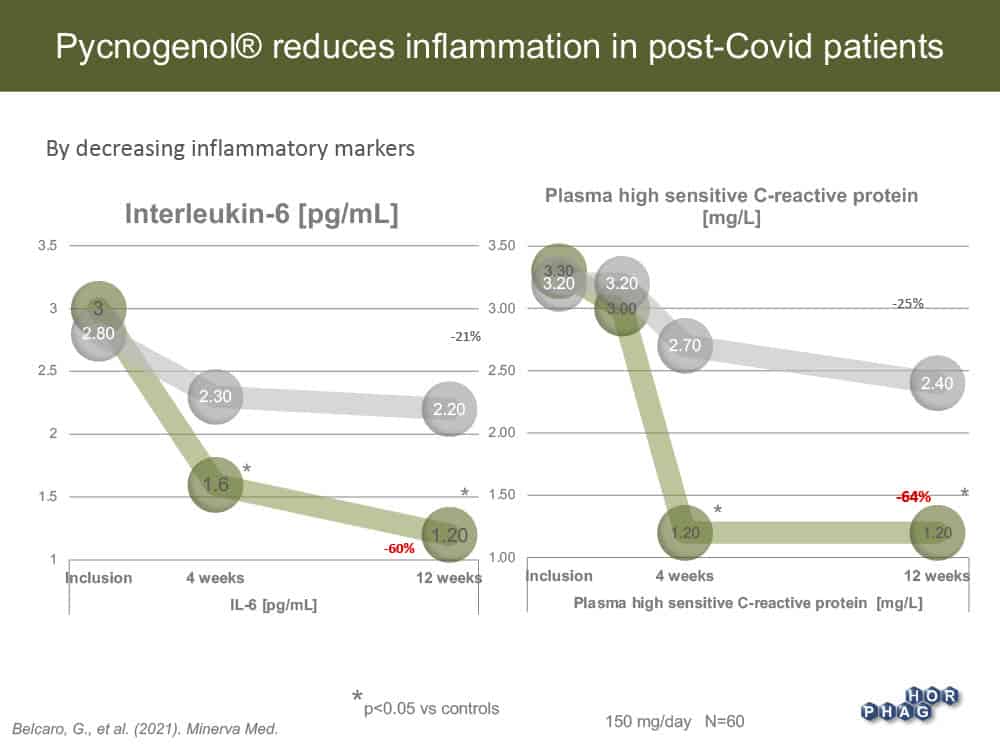
Passwater: What did the study conclude?
Burki:In conclusion, the study found that Pycnogenol offers a significant solution for managing some of the signs and symptoms associated with post-COVID symptoms. Pycnogenol supplementation improves endothelial function and microcirculation, reduces inflammation, and reduces oxidative stress. In addition, with the help of health questionnaires, Pycnogenol could be shown to relieve fatigue, improve the quality of life, mood, and general well-being in post-COVID patients.
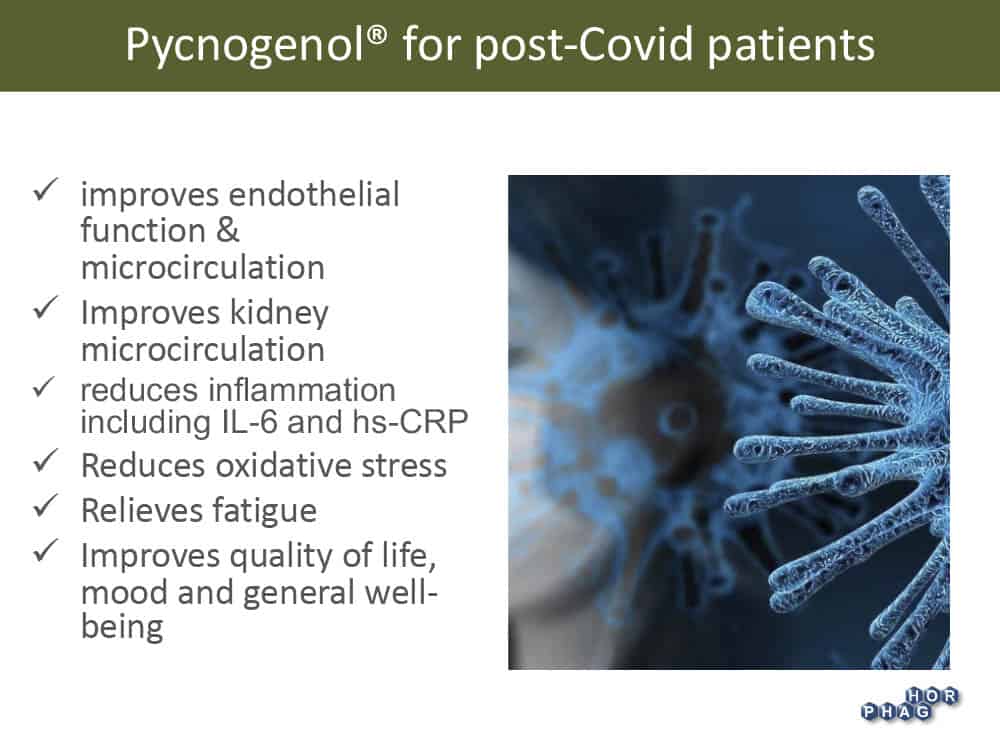
Passwater:Thank you Ms. Burki for discussing the new study by you and your colleagues. I note that the study is ongoing, so maybe we can discuss further details as they develop.
References:
- Komaroff, A. L. The tragedy of long COVID Harvard Health Letter (March 01, 2021) https://www.health.harvard.edu/blog/the-tragedy-of-the-post-covid-long-haulers-202010152479
- Weichmann, F. & Rohdewald, P. Projected supportive effects of Pycnogenol in patients suffering from multi-dimensional health impairments after a SARS-CoV2 infection. Intern. J Antimicrobial Agents 5(6) December 2020, 106191. doi: 10.1016/j.ijantimicag.2020.106191. Epub 2020 Oct 9.
- Belcaro G, Cornelli U, Cesarone MR, Scipione C, Scipione V, Hu S, et al. Preventive effects of Pycnogenol® on cardiovascular risk factors (including endothelial function) and microcirculation in subjects recovering from coronavirus disease 2019 (COVID-19). Minerva Med 2021;112:000-000. DOI: 10.23736/S0026-4806.21.07650-3)

